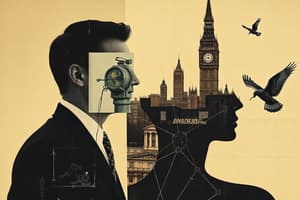Podcast
Questions and Answers
What distinguishes multimodal perception from unimodal perception?
What distinguishes multimodal perception from unimodal perception?
- Multimodal perception is processed in the primary sensory cortex, while unimodal perception is processed in higher-order association areas.
- Unimodal perception processes complex stimuli, while multimodal perception processes only simple stimuli.
- Unimodal perception involves the integration of multiple sensory inputs, while multimodal perception relies on a single sensory input.
- Multimodal perception involves the integration of multiple sensory inputs, while unimodal perception relies on a single sensory input. (correct)
Which of the following is an example of a stimulus attribute that can influence perception?
Which of the following is an example of a stimulus attribute that can influence perception?
- Belief
- Memory
- Emotion
- Modality (correct)
In unimodal processing, what is the role of primary receiving areas in the cortex?
In unimodal processing, what is the role of primary receiving areas in the cortex?
- They process complex, high-level stimulus features.
- They integrate information from multiple sensory modalities.
- They filter out irrelevant sensory information.
- They process simple, low-level stimulus features from distinct sensory inputs. (correct)
How does the super-additive effect enhance perception in multimodal scenarios?
How does the super-additive effect enhance perception in multimodal scenarios?
According to the principle of inverse effectiveness, how does the responsiveness to individual sensory stimuli impact multisensory integration?
According to the principle of inverse effectiveness, how does the responsiveness to individual sensory stimuli impact multisensory integration?
What is the primary function of multisensory convergence zones in the brain?
What is the primary function of multisensory convergence zones in the brain?
What role does the superior temporal sulcus (STS) play in multisensory processing?
What role does the superior temporal sulcus (STS) play in multisensory processing?
Which of the following describes the function of the superior colliculus in multisensory integration?
Which of the following describes the function of the superior colliculus in multisensory integration?
How has the understanding of multisensory areas in the neocortex evolved?
How has the understanding of multisensory areas in the neocortex evolved?
What is the 'binding problem' in the context of perception?
What is the 'binding problem' in the context of perception?
How does the McGurk effect demonstrate the interaction between different sensory modalities?
How does the McGurk effect demonstrate the interaction between different sensory modalities?
In the 'Rubber Hand Illusion', what sensory inputs are integrated to create the illusion?
In the 'Rubber Hand Illusion', what sensory inputs are integrated to create the illusion?
What sensory modalities are involved in creating the Bouncing Balls Illusion?
What sensory modalities are involved in creating the Bouncing Balls Illusion?
Which of the following is NOT considered an attribute of stimuli that influences perception?
Which of the following is NOT considered an attribute of stimuli that influences perception?
If a researcher is studying how the brain integrates the sound of a musical instrument with the sight of it being played, which brain area would be most relevant to investigate?
If a researcher is studying how the brain integrates the sound of a musical instrument with the sight of it being played, which brain area would be most relevant to investigate?
Which scenario best illustrates the principle of inverse effectiveness in multimodal perception?
Which scenario best illustrates the principle of inverse effectiveness in multimodal perception?
Philosopher Daniel Dennett's view on the unified experience of consciousness aligns best with which statement?
Philosopher Daniel Dennett's view on the unified experience of consciousness aligns best with which statement?
What is the MOST likely outcome if someone with damage to their superior colliculus (SC) attempts to locate a sudden, unexpected sound?
What is the MOST likely outcome if someone with damage to their superior colliculus (SC) attempts to locate a sudden, unexpected sound?
A chef expertly combines flavors, aromas, and textures to create a dish that is more satisfying than the sum of its individual components. This is an example of:
A chef expertly combines flavors, aromas, and textures to create a dish that is more satisfying than the sum of its individual components. This is an example of:
Which of the following scenarios exemplifies how perception of stimuli sharing location, timing, and duration can generate emergent properties?
Which of the following scenarios exemplifies how perception of stimuli sharing location, timing, and duration can generate emergent properties?
Flashcards
What is Unimodal Perception?
What is Unimodal Perception?
Perception involving a single sensory/perceptual process.
What is Multimodal Perception?
What is Multimodal Perception?
Perception that combines various sensory modalities such as vision, audition, touch, and proprioception.
What are the Attributes of Stimuli?
What are the Attributes of Stimuli?
Sensory Modality, Intensity, Location, and Duration.
What are Primary Receiving Areas?
What are Primary Receiving Areas?
Signup and view all the flashcards
What is the Super-additive effect of multimodal perception?
What is the Super-additive effect of multimodal perception?
Signup and view all the flashcards
What is the Principle of Inverse Effectiveness?
What is the Principle of Inverse Effectiveness?
Signup and view all the flashcards
What are Multisensory Convergence Zones?
What are Multisensory Convergence Zones?
Signup and view all the flashcards
What is the Superior Temporal Sulcus?
What is the Superior Temporal Sulcus?
Signup and view all the flashcards
What is the Superior Colliculus?
What is the Superior Colliculus?
Signup and view all the flashcards
What is the Binding Problem?
What is the Binding Problem?
Signup and view all the flashcards
What is the McGurk Effect?
What is the McGurk Effect?
Signup and view all the flashcards
What is the Rubber Hand Illusion?
What is the Rubber Hand Illusion?
Signup and view all the flashcards
What is the Bouncing Balls Illusion?
What is the Bouncing Balls Illusion?
Signup and view all the flashcards
Study Notes
- Multi-modal Perception is when multiple senses are being used simultaneously
Our Sensory World
- Unimodal processing is a single sensory or perceptual process
- Multimodal processing is combining various modalities like vision, audition, touch, proprioception
- Perceptions are frequently multimodal
Attributes of Stimuli
- Stimuli attributes include modality, intensity, location, and duration
- Perception of stimuli in different modalities sharing location, timing, and duration can result in emergent properties
Unimodal Processing
- The cortex has primary receiving areas for distinct sensory inputs
- These areas process simple, low-level stimulus features
- Area V1, the primary visual area, is the first stage of cortical processing of visual information like orientation, movement and edges
The Super-Additive Effect
- Multisensory input can improve perception of ambiguous unisensory information
- Visual and auditory information together can improve perception more than the sum of their individual inputs with the whole being greater than the sum of its parts
Principle of Inverse Effectiveness
- As responsiveness to individual sensory stimuli decreases, the strength of multisensory integration increases
Multisensory Convergence Zones
- These convergence zones are brain areas where input from more than one sensory modality converges
- Multisensory convergence zones combine this input to create a unified perceptual experience
- The superior temporal sulcus has individual cells that respond to inputs from vision and speech
- The superior colliculus receives inputs from vision and audition centers, and is involved in reflexive head movements to orient toward stimuli
Multisensory Areas of the Neocortex
- Traditionally the cortex was understood to have select multisensory areas
- More recent anatomical and electrophysiological data has shown the cortex to be multisensory
The Binding Problem
- The binding problem is the challenge of understanding how the brain integrates sensory features like color, shape, and location
- These features are processed in different brain areas to create a unified perception of an object or event
Effects Highlighting Multi-Modal Perception
- The McGurk Effect is the phenomena where visual stimuli impacts the perception of speech
- The Rubber Hand Illusion is where combined vision and tactile sensation can create an illusion of body ownership of a rubber hand
- The Bouncing Balls Illusion joins vision and audition to create an illusion of collision before or after collision occurs
Studying That Suits You
Use AI to generate personalized quizzes and flashcards to suit your learning preferences.



